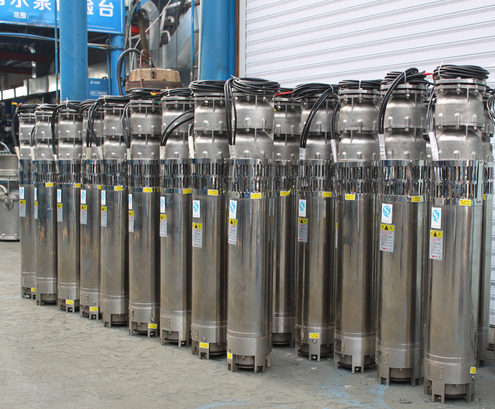Insufficient flow of stainless steel submersible pump
Stainless steel submersible pumps may encounter insufficient flow during use, which may be caused by a variety of factors. The following is a detailed analysis of the problem of insufficient flow in stainless steel submersible pumps and the corresponding treatment methods:
1. Possible causes
Installation height problem
The installation height of the stainless steel submersible pump is too high, resulting in insufficient immersion depth of the impeller, which affects the water output of the pump.
Steering problem
The pump turns in the opposite direction, so that the water flow cannot be discharged correctly, resulting in insufficient flow.
Valve problem
The outlet valve fails to open completely or the valve fails, restricting the passage of water.
Pipeline problem
The outlet pipeline is not smooth, such as pipeline blockage, too many elbows or too small pipeline diameter, which will increase water flow resistance and reduce flow.
Impeller problem
The impeller is blocked or damaged and cannot rotate effectively, thus affecting the discharge of water flow.
Wear ring problem
The wear ring at the lower end of the pump is severely worn or blocked by debris, resulting in water leakage and reduced flow.
Liquid property problem
The pumped liquid has too high density or too high viscosity, which increases the load of the pump and causes a decrease in flow.
Problems with multiple water pumps sharing
When multiple water pumps share the same pipeline output, if a one-way valve is not installed or the one-way valve is not tightly sealed, the water flow may interfere with each other and affect the flow rate.
2. Treatment method
Adjust the installation height
Control the installation elevation of the stainless steel submersible pump to ensure that the impeller has sufficient immersion depth. Installation should be carried out in accordance with the provisions in the instructions to avoid arbitrarily expanding the allowable deviation of the installation elevation.
Check and adjust the direction
Before the water pump is tested, first idle the motor and check the direction to make it consistent with the water pump. If the direction is found to be opposite during use, check whether the power phase sequence has changed and adjust it in time.
Check and maintain the valve
Regularly check the status of the water outlet valve to ensure that it can be fully opened and without faults. Perform necessary maintenance and maintenance on the valve, such as cleaning up debris, replacing damaged parts, etc.
Clean the pipeline and impeller
Clean up the blockage in the water outlet pipeline to ensure that the pipeline is unobstructed. At the same time, clean up the debris and dirt on the impeller to keep the impeller clean and intact.
Replace the wear ring
If the wear ring at the lower end of the water pump is found to be severely worn or blocked by debris, the debris should be cleaned up and replaced with a new wear ring in time.
Improve the properties of the liquid
For the problem of excessive density or high viscosity of the pumped liquid, the cause of the water quality change can be found and treated. If the water quality conditions cannot be changed, consider replacing the water pump model suitable for the properties of the liquid.
Install or replace the one-way valve
When multiple water pumps share the same pipeline output, a one-way valve should be installed and ensure that it is well sealed. If a one-way valve has been installed but the seal is not tight, a new valve should be replaced in time.

Adjust the throttle valve
The flow adjustment of the submersible pump can be achieved by adjusting the throttle valve. The throttle valve is one of the devices at the outlet of the submersible pump. By adjusting its size, the area through which the water flows can be limited, thereby achieving the purpose of adjusting the water flow.




